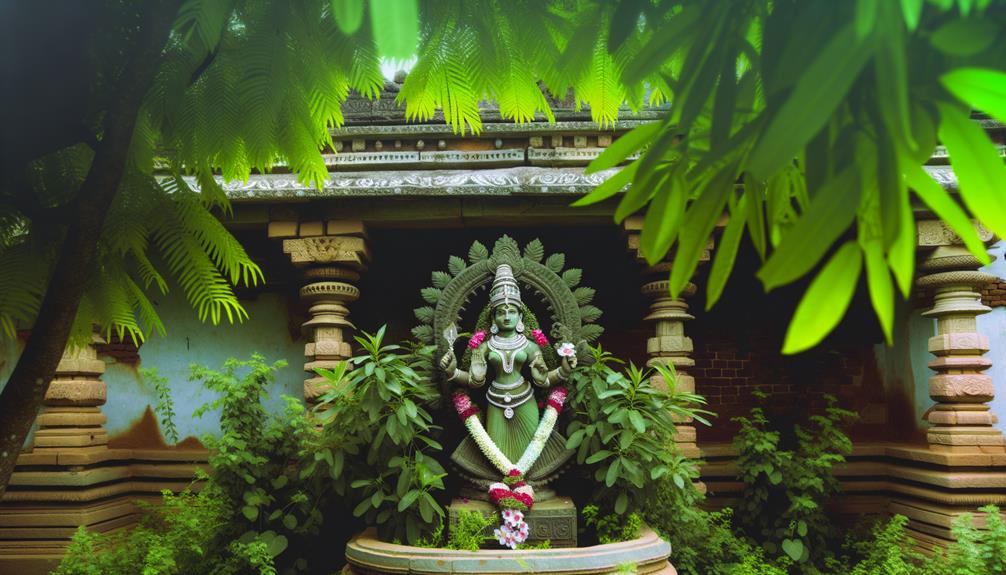Kali Name Meaning in English
The name Kali originates from the ancient Sanskrit word 'kala', which means 'time' and 'black'. In Hindu mythology, Kali is a multifaceted goddess embodying destruction, transformation, and rebirth.
She is often depicted with dark skin, symbolizing the infinite void and the unknown. Her iconography, including a garland of severed heads and multiple arms, represents dominion over death, fierce protection, and the annihilation of ego.
Contemporary usage and cultural significance of the name Kali extend to notions of strength, empowerment, and individuality. Understanding these layers reveals the profound depth behind the name Kali.

Key Takeaways
- Kali is derived from the Sanskrit word 'kala,' meaning 'time' or 'black.'
- The name Kali symbolizes the cyclical nature of existence and the infinite void.
- In Hindu mythology, Kali represents destruction, transformation, and rebirth.
- Kali's dark complexion and fierce iconography signify dominion over death and time.
- The name Kali reflects empowerment, strength, and individuality in modern culture.
Etymology of Kali
The etymology of the name 'Kali' traces its origins to the Sanskrit language, where it is derived from the root word 'kala,' meaning 'time' or 'black.'
This dual meaning is significant, highlighting the multifaceted nature of Kali within linguistic and cultural contexts. 'Kala' as 'time' represents the inexorable, cyclical nature of existence, while 'black' symbolizes the unknown, the infinite, and the primal void.
The term 'Kali' also appears in classical Sanskrit literature, where it further embodies concepts of change, destruction, and rebirth. This rich etymological background of the name 'Kali' provides a profound understanding of the linguistic roots that shape its complex symbolism, setting the stage for deeper exploration into its mythological and cultural significance.
Kali in Hindu Mythology
Building upon the etymological foundation, Kali's role in Hindu mythology is both complex and multifaceted, embodying aspects of destruction, transformation, and rebirth that are essential to the cosmic cycle.
As a fierce manifestation of the goddess Parvati, Kali represents the potent force that annihilates illusion and ignorance. Her iconography—often depicted with a garland of skulls and a skirt of severed arms—symbolizes her dominion over death and time.
In the sacred texts, Kali's intervention is vital during battles against demonic forces, signifying her protective and purifying nature. Yet, her ferocity is balanced by her role as a nurturer, underscoring the duality inherent in her divine essence.
Through these narratives, Kali's mythological significance is established as both fearsome and benevolent.
Symbolism and Interpretations
Kali's iconography serves as a profound symbolic representation of her complex divinity, encapsulating themes of destruction, time, and transformative power. Her dark complexion signifies the infinite void from which all creation emerges and to which it returns.
The garland of severed heads symbolizes the cyclical nature of life and death, while her protruding tongue represents her insatiable hunger for cosmic dissolution. Her multiple arms wielding weapons highlight her role as a fierce protector, slayer of demons, and embodiment of Shakti—divine feminine energy.
The decapitated head she often holds signifies the annihilation of ego, essential for spiritual liberation. This intricate symbology paints Kali not merely as a destroyer, but as a powerful catalyst for profound transformation and rebirth.
Modern Usage of Kali
In contemporary culture, the name Kali has seen a resurgence in popularity, often embraced for its strong, multifaceted connotations. This modern usage spans various domains, including literature, film, and personal names, reflecting its adaptability and enduring appeal.
Additionally, cultural adaptations today have broadened its significance, intertwining traditional symbolism with contemporary interpretations and values.
Contemporary Popularity Trends
The name Kali has seen a significant resurgence in popularity in recent years, reflecting broader cultural shifts and changing perceptions regarding its historical and spiritual connotations. This renewed interest can be attributed to various factors:
- Media Influence: Popular television series and films featuring strong, independent characters named Kali.
- Spiritual Reawakening: An increasing number of people exploring Eastern philosophies and practices.
- Unique Identity: Parents seeking distinctive names that reflect strength and individuality.
- Globalization: Enhanced cultural exchange making names from diverse traditions more accessible.
These elements collectively contribute to the modern appeal of the name Kali, aligning it with contemporary values of empowerment and cultural appreciation. This trend signifies a broader acceptance and celebration of names with deep, multifaceted origins.
Cultural Adaptations Today
Modern usage of the name Kali reflects its integration into various cultural contexts, highlighting its versatility and enduring appeal. This name has transcended its traditional Hindu roots, finding relevance in different spheres such as pop culture, literature, and personal naming conventions. Below is a table that illustrates its modern adaptations: Kali has become a symbol of female empowerment and strength, and its use in popular media and literature reflects this evolution. In personal naming conventions, Kali is chosen for its contemporary and edgy appeal, often symbolizing rebellion or non-conformity. In Hindu tradition, Kali is considered a fierce and powerful goddess, and her name may be chosen to reflect these qualities in an individual.
The phrase ‘meaning of tara in english‘ signifies an interest in understanding the translation of the name “Tara” in English, which may also reflect broader trends in the modern usage and adaptation of names from different cultural traditions.
| Context | Example | Significance |
|---|---|---|
| Pop Culture | TV Shows, Movies | Represents strength, mystery, or supernatural elements |
| Literature | Fantasy, Mythology | Symbolizes power, transformation, and feminine energy |
| Personal Names | Western Naming Trends | Chosen for its unique sound and cultural richness |
In these diverse settings, the name Kali maintains a connection to its origins while evolving to suit contemporary tastes and interpretations.
Kali in Popular Culture
Kali's influence extends beyond traditional religious contexts into various facets of popular culture, prominently manifesting in mythological representation, film and television, as well as music and literature.
In mythological narratives, Kali is often depicted as a fierce embodiment of destruction and empowerment. Moreover, contemporary media such as movies, TV shows, and literary works frequently leverage her complex symbolism to explore themes of power, transformation, and resistance.
Mythological Representation
Represented as a powerful goddess in Hindu mythology, Kali embodies both creation and destruction, making her a complex figure in popular culture. Often depicted with fierce features, her iconography is rich with symbolic elements that convey her multifaceted nature.
- Four arms: Each hand holds a distinct item, including a sword and a severed head, symbolizing the cycle of life and death.
- Dark complexion: Her dark skin represents the womb of the universe, from which all creation springs and ultimately returns.
- Garland of skulls: This adornment signifies victory over evil and the impermanence of physical life.
- Lolling tongue: Her protruding tongue symbolizes her insatiable nature and the destruction of ego.
Kali's imagery powerfully conveys her roles as both a nurturer and a destroyer.
Film and Television
Exploring Kali's portrayal in film and television reveals a dynamic interpretation of her mythological essence, blending traditional symbolism with contemporary narratives.
In cinema, Kali often embodies themes of destruction and rebirth, as seen in films like 'Indiana Jones and the Temple of Doom,' where she is depicted as a powerful, albeit misunderstood, deity.
Television series such as 'Supernatural' and 'American Gods' further contextualize Kali within modern frameworks, presenting her as a complex character who transcends simplistic good-versus-evil dichotomies.
These portrayals often highlight her fierce independence and transformative power, resonating with contemporary audiences while retaining her ancient roots.
Such representations underscore Kali's multifaceted nature, offering a nuanced view that enriches her cultural and spiritual significance.
Music and Literature
In the worlds of music and literature, Kali emerges as a potent symbol, inspiring a wide array of creative works that explore her complex and transformative nature. Her multifaceted persona, embodying both destruction and creation, serves as a rich source of inspiration.
- Literary Works: Authors have penned novels and poems delving into her fierce, yet nurturing qualities, such as Salman Rushdie's 'The Satanic Verses.'
- Music: Artists and composers incorporate her imagery and themes into their compositions, exemplified by John Zorn's intricate piece 'Kali.'
- Poetry: Poets often invoke Kali to symbolize empowerment and rebellion, as seen in works by contemporary feminist writers.
- Mythological Retellings: Modern retellings of ancient myths, like those by Devdutt Pattanaik, offer nuanced portrayals of Kali's divine attributes.
These creative endeavors deepen our understanding of Kali's enduring significance.
Cultural Significance Today
Today, the cultural significance of the name Kali extends beyond its historical roots, permeating various aspects of modern society including literature, spirituality, and popular media.
In contemporary literature, Kali often symbolizes empowerment and transformation, reflecting her mythological essence as a force of change.
Spiritually, she remains a pivotal figure in Hinduism, representing both destruction and rebirth, and is invoked in rituals and personal meditative practices.
Popular media frequently incorporates Kali, showcasing her as a strong, complex character in films, television series, and graphic novels.
This multifaceted representation underscores her enduring relevance and adaptability, highlighting how ancient symbolism can be reinterpreted to address modern themes and challenges.
Consequently, Kali's name continues to resonate profoundly in today's cultural landscape.
Conclusion
Ironically, the name 'Kali,' often associated with darkness and destruction, embodies deep spiritual symbolism and cultural significance.
Originating from the Sanskrit word for 'time' or 'black,' Kali in Hindu mythology represents both the end and the beginning, destruction and creation.
Contemporary interpretations and popular culture have further diversified its meaning, illustrating the paradox of a name that signifies both fear and reverence, chaos and order, encapsulating the complex dualities of existence.






